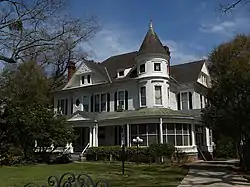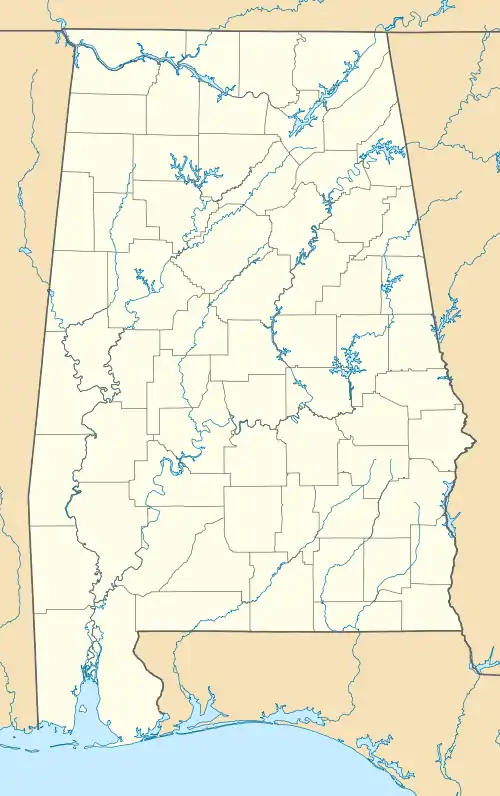Bell House (Prattville, Alabama)
The Bell House (also known as Biggs House) is a historic house located at 550 Upper Kingston Road in Prattville, Alabama. It is locally significant as an excellent example of the Queen Anne style of architecture, that reached its zenith in Alabama at the turn of the 20th century and continued locally as late as 1920.
Bell House | |
 The house in 2010 | |
  | |
| Location | 550 Upper Kingston Rd., Prattville, Alabama |
|---|---|
| Coordinates | 32°28′17″N 86°28′40″W |
| Area | 1 acre (0.40 ha) |
| Built | 1893 |
| Architect | Lockwood, Frank |
| Architectural style | Queen Anne |
| NRHP reference No. | 99000150[1] |
| Significant dates | |
| Added to NRHP | February 12, 1999 |
| Designated ARLH | October 7, 1998[2] |
Description and history
The Queen Anne style 2+1⁄2-story wood-frame house was completed in 1893. It is designed by Alabama architect Frank Lockwood. It was added to the National Register of Historic Places on July 17, 1997, and on the Alabama Register of Landmarks and Heritage on October 7, 1998.[1][2]
Joseph Bennett Bell, son of Jonathan Ezekiel and Georgiana (Bennett) Bell, was born in Greenville, Alabama on November 18, 1859. He was raised in Greenville and moved to Montgomery upon the completion of his education and obtained a job as a clerk at a hardware store. Bell married Mary Pratt, daughter of Julia (Smith) and Merrill Pratt on November 17, 1889. Merrill was the nephew of Prattsville town founder Daniel Pratt and was named heir of half his fortune upon his death in 1873. Bell moved to Prattville in early 1890 and served as a manager for the order department of the Daniel Pratt Gin Company as well as a stockholder and manager for the Pratt Company. The Bell House was constructed in 1893. Bell was listed as a secretary for the Prattville Mercantile Company in 1905, and served as a member for the State Legislature representing Autauga County from 1911 to 1915. In April 1919, Bell was appointed probate judge of the county, of which he served until October of the same year. Joseph and Mary raised their eight children until Joseph died in 1937; Mary followed him in 1945. That same year, the Bells daughters Katherine and Adelaide (whom the former had returned from service in World War II) lived in the house until they sold it to Thomas H. Walker in October 1949. In 1970, the house was sold to Colonel Ernest and Martha Biggs by Nancy and Hyman Hamner, the former of which are the recorded owners as of 1998.
In 1994, the house was used as a filming location for Charles Matthau’s 1995 film The Grass Harp, based on Truman Capote’s novella of the same name.[2]
See also
References
- "National Register Information System". National Register of Historic Places. National Park Service. March 13, 2009.
- "Properties on the Alabama Register of Landmarks & Heritage". Alabama Historical Commission. www.preserveala.org. Archived from the original on September 4, 2012. Retrieved October 25, 2012.